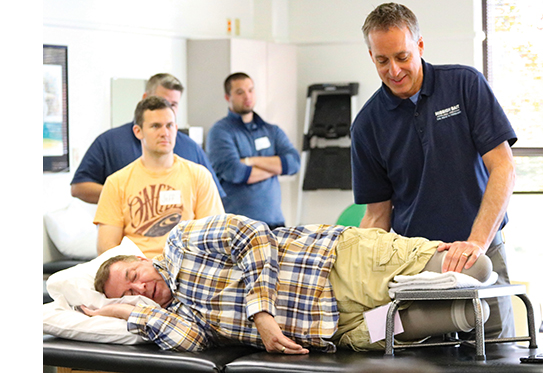Physical therapist David Lawrence says his profession serves about 80 percent of patients very well. Leg amputees, unfortunately, are in the other 20 percent.
“If you have complex gait issues, the system just isn’t set up to deal with you,” says Lawrence, owner and chief practitioner at The Gait Center in Richmond, Virginia. “So leg amputees get undertreated dramatically. There’s a huge gap in access to quality care.”

Porous insurance and reimbursement policies deter PTs from giving amputees sufficient time and attention. The same disincentives keep most PTs from acquiring the specialized knowledge necessary to optimize amputees’ outcomes.
“You should always walk out of your session feeling more empowered to live your life at the highest level.”
That’s why Lawrence launched the Mission Gait Foundation in 2016. His nonprofit aims to raise standards across the board, equipping PTs with the clinical expertise they need to work effectively with amputees. The organization’s Gait Certification Course, which includes two days of instructor-led training and 18 months of self-guided study, teaches PTs evidence-based techniques that promote balance, strength, and mobility after limb loss.
The first graduates should earn certification later this year. Over time, Lawrence hopes to develop a nationwide database of gait-certified PTs so every amputee can locate a well-trained practitioner nearby. Mission Gait also seeks to educate amputees themselves, providing an extensive library of free educational videos and other resources to help patients understand best practices, advocate for themselves, and hold practitioners accountable.
“We all need to have this understanding,” Lawrence says. “That’s the only way we all succeed. You should always walk out of your session feeling more empowered to live your life at the highest level.”
Cost is another common barrier to physical therapy, but there’s good news on that front as well. Abled Amputees of America, a Georgia-based nonprofit that helps amputees afford the PT they need, added two new funding sources this spring, vastly expanding the number of people it can support.
“Most insurance plans cover a limited number of [physical therapy] sessions,” says Abled Amputees founder Doug Durham, “and the ones that are covered often have a hefty copay. A lot of people just can’t afford it.”
If that describes you, contact Abled Amputees at www.abledamputees.org. The coffers are full, and they’re actively seeking new applicants.



